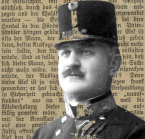Alfred Redl’s ‘homosexuality’ is one of the most written-about aspects of his life and has come to define Austria-Hungary’s famous counterespionage agent and traitor. The various commentators who’ve tackled his story seem to be preoccupied with this one dimension of the colonel’s sex life to the extent that it’s all they see. This is exactly the situation that General Staff Chief Conrad von Hötzendorf wished to create when he made these sexual allegations for the first time on May 29th, 1913 through the pages of Militärische Rundschau, a military-sponsored newspaper which he controlled.
In the days following this allegation, at least two military officers told the press (under anonymity) that through the course of their acquaintance with the late colonel they’d never noticed any homosexual inclinations, in fact he was noted for his routinely generous patronage of female prostitutes. It is important to recognize that since these statements were contrary to the message put out by the General Staff, they were professionally dangerous for an officer to make— yet they were made none the less.
From the comfortable distance of one century and three governments, modern historians should come to terms with the fact that homosexuality was only one aspect of Redl’s personality and not the ‘key to his undoing’ that Hötzendorf promoted it as being. Indeed, Hötzendorf most likely chose to blame Redl’s homosexuality for his criminality because of Archduke Franz Ferdinand’s use of Die Zeit, a paper which had for a decade promoted homosexuality and other ‘modern’ attitudes, to attack the War Ministry in the days following Redl’s death.
‘Homosexual Redl’ was more a by-product of the social program espoused by Vienna’s leading avant gard newspaper than it was military attitudes towards illicit sex. Once Conrad had whipped out ‘homosexuality’ as the excuse for Redl’s behavior, Franz Ferdinand immediately softened his criticism of the War Ministry on the pages of Die Zeit. The gory details are available in my forthcoming book, A Journalist for Me.
This shouldn’t be surprising to historians following debate on Redl over the last few decades. One of the best papers on the colonel, Redl— Spy of the Century? by J. R. Schindler, places fin de siècle Viennese homosexuality in perspective:
Homosexuality was a career-ender for Habsburg officers and civil servants in theory, but less often in practice….
Moreover, homosexuals were not uncommon in the Habsburg bureaucracy, military and civil. General Oskar Potiorek, commanding general on the Balkan front in 1914, was widely known to be a homosexual… In the last decades of Habsburg rule, a tolerance of homosexuality, at least among the better-born, often prevailed. Emperor Franz Joseph’s younger brother, Archduke Ludwig Viktor, known in the family as Luzivuzi, was a cross-dresser who preferred liaisons with army officers, and was notorious for his ‘‘unnatural affections’’ with military men.
In truth, it’s misleading to say that homosexuality was tolerated in Vienna. Among the wealthiest and best connected segments of society, particularly the Ringstrasse art patrons, homosexuality was promoted. These same art patrons owned influential journals and liberal newspapers which manipulated the public’s understanding of Redl’s suicide. By using the late colonel’s homosexuality to fight attacks from the press, Conrad engaged in a David-and-Goliath battle with the Großpresse using a weapon from the giant’s own arsenal.
All this begs the question, was Alfred Redl even homosexual? Certainly the editors of Die Zeit had their doubts, as did most of Vienna’s liberal editors. The only immediate evidence of his homosexuality outside of Conrad’s control was the testimony of Redl’s family, who were under suspicion of espionage themselves. One of Redl’s brothers told Neue Freie Presse that his first indication of Redl’s gayness came after the suicide, when he was contacted by one of Redl’s young lovers, who feared the colonel had committed suicide because of a recent break-up. Naturally this came at a convenient time for both Conrad and the Redl clan.
I suspect that Alfred Redl was bisexual and that for him sex— homosexual or otherwise— was just another way to express his prestige and power. His alleged affairs with expensive demimonde women were as public as his alleged extravagant courting of young Uhlan lieutenants. Redl was narcissistic and this would have colored all aspects of his personal life. The time has long passed to get over preoccupations with ‘homosexual Redl’.

